 Photo: Image from an album by Nick Drake
Photo: Image from an album by Nick DrakeDelmore Schwartz mentions December in several of his poems. This is probably because he was born in December (8th). I think we all see deep significance in the month in which we were born.
December has always been one of my favorite months. It probably started out that way because of Christmas. Later, December signaled time off from school. My mother's birthday was in December and my youngest son was born December 30.
Now I appreciate December's darkness, the solstice, and all the solstice represents about death and renewal.
Delmore Schwartz didn't make the cut for the seminar I'm teaching. I'll still be able to share some of his personal lyrics with the class, though. Before Christmas, I allowed them to choose which authors they wanted to look at closely and they chose: William Blake, Walt Whitman, Theodore Roethke, James Wright, John Berryman, Anne Sexton, Tobias Wolfe, and Dorothy Allison.
I suspect no one chose Schwartz because they'd never heard of him, so that's why it's important that I introduce them to this fine poet, at least. Schwartz's "During December's Death" definitely is about thresholds:
The afternoon turned dark early;
The light suddenly faded;
The dusk was black although, elsewhere, the first star in the cold sky
suddenly whistled,
And I thought I heard the fresh scraping of the flying steel of boys on
roller skates
Rollicking over the asphalt in 1926,
And I thought I heard the dusk and silence raided
By a calm voice commanding consciousness:
Wait: wait: wait as if you had always waited
And as if it had always been dark
And as if the world had been from the beginning
A lost and drunken ark in which the only light
Was the dread and white of the terrified animals' eyes.
And then, turning on the light, I took a book
That I might gaze upon another's vision of the abyss of conscious-
ness--
The hope, and the pain of hope, and the patience of hope and its
torment, its astonishment, its endlessness.
Here is an image of death as the abyss, terrible death as it exists in nature, a place not ordered but chaotic, a "drunken ark." Schwartz focuses on the frightening moment before the dark predator--death-- strikes.
I think it's odd how this poem foretells Schwartz's death, almost as though he had a premonition that he would die white-eyed with terror.
I love the last lines, where the speaker, frightened by the voices from the dark, takes a book and searches for the hope of renewal that death brings: death's "hope...pain of hope...patience of hope...its torment, its astonishment, its endlessness."
What better month than December to embody all this? December is a threshold-month.
Delmore Schwartz loved poetry; he loved to write. I think he tried until the very end to give himself ENTIRELY to what he loved best; He encouraged his friend, John Berryman, to do the same. Without Schwartz's encouragement, Berryman probably wouldn't have gone as far as he did with his writing.
December has always been one of my favorite months. It probably started out that way because of Christmas. Later, December signaled time off from school. My mother's birthday was in December and my youngest son was born December 30.
Now I appreciate December's darkness, the solstice, and all the solstice represents about death and renewal.
Delmore Schwartz didn't make the cut for the seminar I'm teaching. I'll still be able to share some of his personal lyrics with the class, though. Before Christmas, I allowed them to choose which authors they wanted to look at closely and they chose: William Blake, Walt Whitman, Theodore Roethke, James Wright, John Berryman, Anne Sexton, Tobias Wolfe, and Dorothy Allison.
I suspect no one chose Schwartz because they'd never heard of him, so that's why it's important that I introduce them to this fine poet, at least. Schwartz's "During December's Death" definitely is about thresholds:
The afternoon turned dark early;
The light suddenly faded;
The dusk was black although, elsewhere, the first star in the cold sky
suddenly whistled,
And I thought I heard the fresh scraping of the flying steel of boys on
roller skates
Rollicking over the asphalt in 1926,
And I thought I heard the dusk and silence raided
By a calm voice commanding consciousness:
Wait: wait: wait as if you had always waited
And as if it had always been dark
And as if the world had been from the beginning
A lost and drunken ark in which the only light
Was the dread and white of the terrified animals' eyes.
And then, turning on the light, I took a book
That I might gaze upon another's vision of the abyss of conscious-
ness--
The hope, and the pain of hope, and the patience of hope and its
torment, its astonishment, its endlessness.
Here is an image of death as the abyss, terrible death as it exists in nature, a place not ordered but chaotic, a "drunken ark." Schwartz focuses on the frightening moment before the dark predator--death-- strikes.
I think it's odd how this poem foretells Schwartz's death, almost as though he had a premonition that he would die white-eyed with terror.
I love the last lines, where the speaker, frightened by the voices from the dark, takes a book and searches for the hope of renewal that death brings: death's "hope...pain of hope...patience of hope...its torment, its astonishment, its endlessness."
What better month than December to embody all this? December is a threshold-month.
Delmore Schwartz loved poetry; he loved to write. I think he tried until the very end to give himself ENTIRELY to what he loved best; He encouraged his friend, John Berryman, to do the same. Without Schwartz's encouragement, Berryman probably wouldn't have gone as far as he did with his writing.



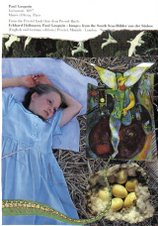


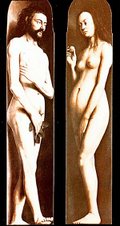

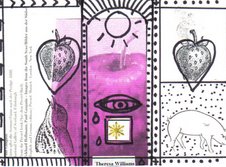
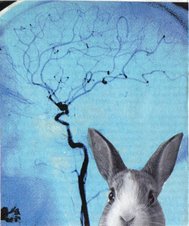
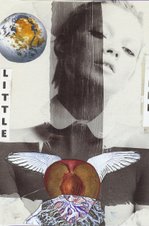
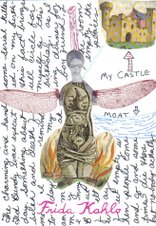
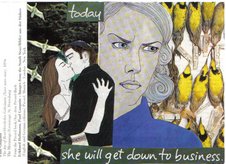

3 comments:
For the listener, who listens in the snow,
And, nothing himself, beholds
Nothing that is not there and the nothing that is.
from Wallace Stevens, The Snow Man
"I had been reading Gaston Bachelard, the Sorbonne philosopher and aesthetician. Bachelard says somewhere that the human imagination simply cannot cope with polar conditions, and so I shot off a postcard to Stevens. He wrote back some splendid sentence about Bachelard is wrong, most art is created out of a condition of winter."
Richard Wilbur
From Peter Brazeau, ed. Parts of a World: Wallace Stevens Remembered
Yes! The dialogue between writers, artists, can be envigorating.
Gretchen
I think you're right about December, and I think you're right about people feeling connected to the month in which they're born. I feel as though a lot of my personality can be explained by the fact that I was born in the Spring.
I have never ready anything by Schwartz, but based on the poem here, I'd like to. I was especially interested in this part:
"The hope, and the pain of hope, and the patience of hope and its
torment, its astonishment, its endlessness."
I'll be thinking about the pain, patience, and endlessness of hope all week. Thank you!
Ah, yes!
"The hope, and the pain of hope, and the patience of hope and its torment, its astonishment, its endlessness."
I am absolutely transfixed by that sentence. Thank you for sharing it with us. I, personally, will never forget it.
Post a Comment